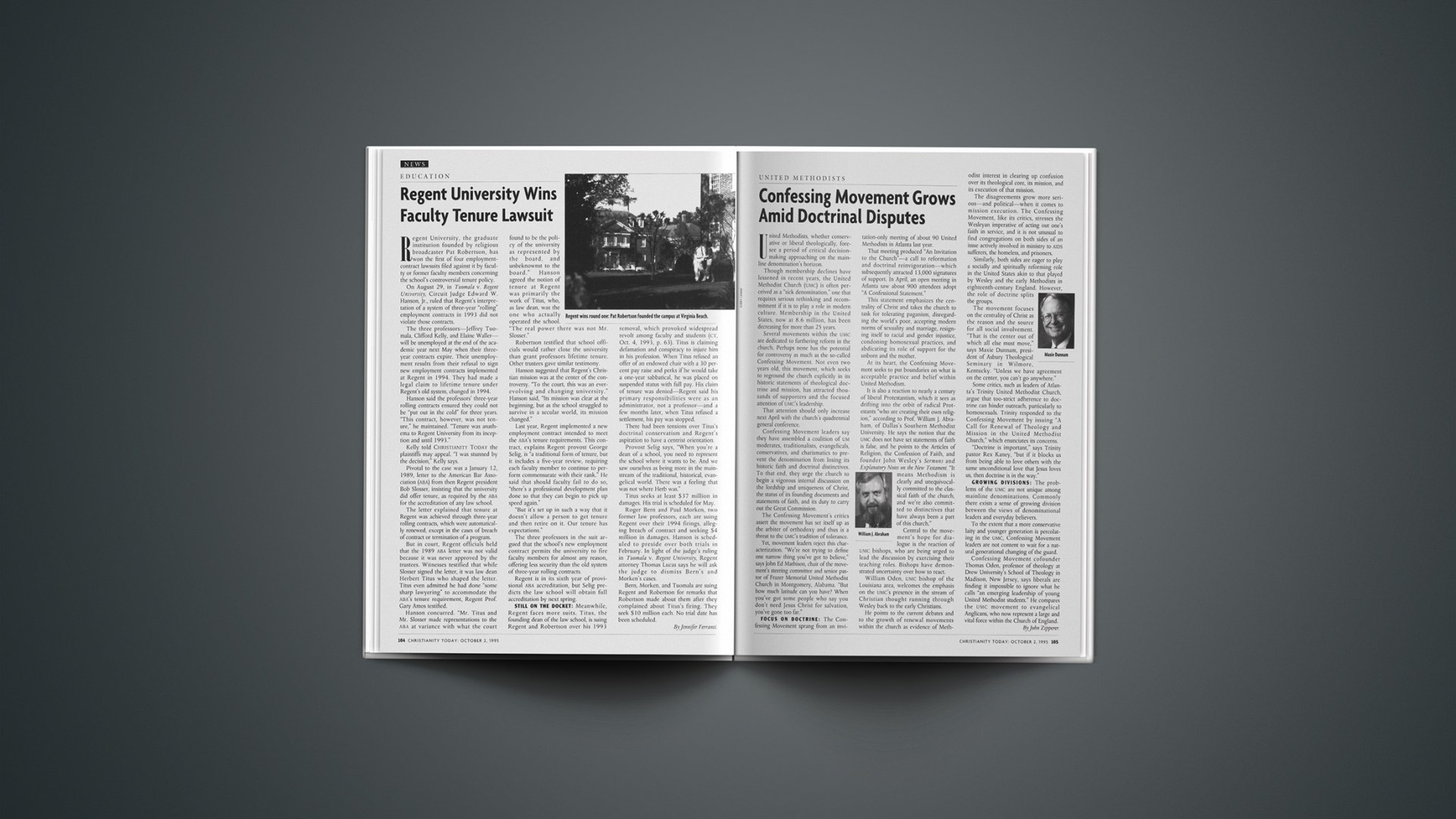Regent University, the graduate institution founded by religious broadcaster Pat Robertson, has won the first of four employment-contract lawsuits filed against it by faculty or former faculty members concerning the school’s controversial tenure policy.
On August 29, in Tuomala v. Regent University, Circuit Judge Edward W. Hanson, Jr., ruled that Regent’s interpretation of a system of three-year “rolling” employment contracts in 1993 did not violate those contracts.
The three professors—Jeffrey Tuomala, Clifford Kelly, and Elaine Waller—will be unemployed at the end of the academic year next May when their three-year contracts expire. Their unemployment results from their refusal to sign new employment contracts implemented at Regent in 1994. They had made a legal claim to lifetime tenure under Regent’s old system, changed in 1994.
Hanson said the professors’ three-year rolling contracts ensured they could not be “put out in the cold” for three years. “This contract, however, was not tenure,” he maintained. “Tenure was anathema to Regent University from its inception and until 1993.”
Kelly told CHRISTIANITY TODAY the plaintiffs may appeal. “I was stunned by the decision,” Kelly says.
Pivotal to the case was a January 12, 1989, letter to the American Bar Association (ABA) from then Regent president Bob Slosser, insisting that the university did offer tenure, as required by the ABA for the accreditation of any law school.
The letter explained that tenure at Regent was achieved through three-year rolling contracts, which were automatically renewed, except in the cases of breach of contract or termination of a program.
But in court, Regent officials held that the 1989 ABA letter was not valid because it was never approved by the trustees. Witnesses testified that while Slosser signed the letter, it was law dean Herbert Titus who shaped the letter. Titus even admitted he had done “some sharp lawyering” to accommodate the ABA’s tenure requirement, Regent Prof. Gary Amos testified.
Hanson concurred. “Mr. Titus and Mr. Slosser made representations to the ABA at variance with what the court found to be the policy of the university as represented by the board, and unbeknownst to the board.” Hanson agreed the notion of tenure at Regent was primarily the work of Titus, who, as law dean, was the one who actually operated the school. “The real power there was not Mr. Slosser.”
Robertson testified that school officials would rather close the university than grant professors lifetime tenure. Other trustees gave similar testimony.
Hanson suggested that Regent’s Christian mission was at the center of the controversy. “To the court, this was an ever-evolving and changing university.” Hanson said, “Its mission was clear at the beginning, but as the school struggled to survive in a secular world, its mission changed.”
Last year, Regent implemented a new employment contract intended to meet the ABA’s tenure requirements. This contract, explains Regent provost George Selig, is “a traditional form of tenure, but it includes a five-year review, requiring each faculty member to continue to perform commensurate with their rank.” He said that should faculty fail to do so, “there’s a professional development plan done so that they can begin to pick up speed again.”
“But it’s set up in such a way that it doesn’t allow a person to get tenure and then retire on it. Our tenure has expectations.”
The three professors in the suit argued that the school’s new employment contract permits the university to fire faculty members for almost any reason, offering less security than the old system of three-year rolling contracts.
Regent is in its sixth year of provisional ABA accreditation, but Selig predicts the law school will obtain full accreditation by next spring.
STILL ON THE DOCKET: Meanwhile, Regent faces more suits. Titus, the founding dean of the law school, is suing Regent and Robertson over his 1993 removal, which provoked widespread revolt among faculty and students (CT, Oct. 4, 1993, p. 63). Titus is claiming defamation and conspiracy to injure him in his profession. When Titus refused an offer of an endowed chair with a 30 percent pay raise and perks if he would take a one-year sabbatical, he was placed on suspended status with full pay. His claim of tenure was denied—Regent said his primary responsibilities were as an administrator, not a professor—and a few months later, when Titus refused a settlement, his pay was stopped.
There had been tensions over Titus’s doctrinal conservatism and Regent’s aspiration to have a centrist orientation.
Provost Selig says, “When you’re a dean of a school, you need to represent the school where it wants to be. And we saw ourselves as being more in the mainstream of the traditional, historical, evangelical world. There was a feeling that was not where Herb was.”
Titus seeks at least $37 million in damages. His trial is scheduled for May.
Roger Bern and Paul Morken, two former law professors, each are suing Regent over their 1994 firings, alleging breach of contract and seeking $4 million in damages. Hanson is scheduled to preside over both trials in February. In light of the judge’s ruling in Tuomala v. Regent University, Regent attorney Thomas Lucas says he will ask the judge to dismiss Bern’s and Morken’s cases.
Bern, Morken, and Tuomala are suing Regent and Robertson for remarks that Robertson made about them after they complained about Titus’s firing. They seek $10 million each. No trial date has been scheduled.
Copyright © 1995 Christianity Today. Click for reprint information.
ctcurrmrw5TB1045919










